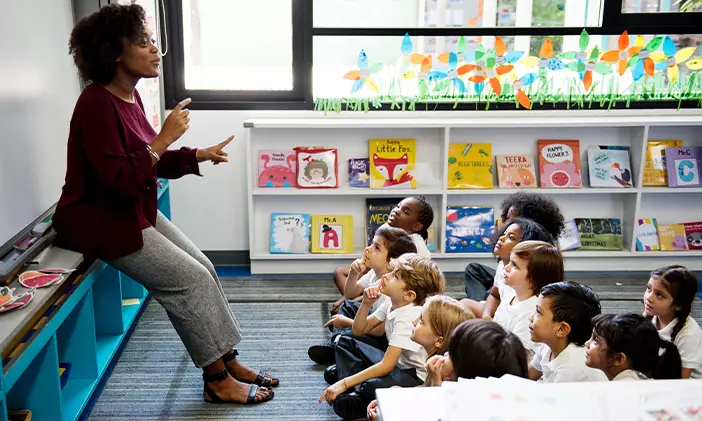An Explanation of Teacher Abuse Through the Lens of Three Important Theories in the Aftermath of the Pandemic

By Juana M. Lang, Ed.D., Karen Johnson, Ed.D., Lucinda Hines, DHA
Context
Following the onset of the COVID-19 pandemic, the United States witnessed a significant surge in classroom and discipline issues, including increased student aggression toward teachers (Panchal et al., 2023). In 2022, The National Center for Education Statistics released data detailing the rise in reported student infractions as follow.
Escalation of Student Infractions in the School Year 2021-2022
- Classroom disruptions 56%
- Acts of disrespect towards teachers and staff 48%
- Rowdiness outside the classroom 49%
- The prohibited use of electronic devices 42%
Our recent study titled "Teacher Experiences with Physical or Verbal Aggression in the Aftermath of COVID-19" sheds light on the exacerbated issue of aggression against teachers by students after the pandemic. One of our authors, Dr. Juana Lang, experienced this issue firsthand. Here is her story and the results of our study. The study was conducted at the Center for Educational and Instructional Technology Research (CEITR).
As a K-12 educator deeply entrenched in the field, I not only experienced firsthand verbal abuse and harassment but also witnessed fellow educators enduring disrespect, unfair treatment, and various forms of abuse. Motivated by these experiences, and with solid data to support this problem, I embarked on phenomenology research with Dr. Karen Johnson and Dr. Lucinda Hines, both faculty members from the University of Phoenix.

Revelations from The Data and Stories of Abuse Unearthed by Three Theories
A significant discovery emerged from the data: participants noted a rise in verbal aggression toward teachers from students, encompassing insults and threats of physical harm. Additionally, one participant encountered a physical assault. Teachers initially felt shock, confusion, anger, and sadness in response to these incidents, emotions that endured throughout the study, leading to feelings of worry, anxiety, and distrust.
The study was grounded in three crucial theories: The Social Learning theory, The Attribution theory, and The Transactional Stress theory. The selection of this framework propelled an exhaustive literature review on the topic.
The literature commonly depicts the Social Learning theory as a pivotal framework for elucidating violence and abuse (Mihalic & Elliot, 1997). This theory, championed by Bandura, posits that aggression is acquired through imitation, observation, and modeling (Bandura & Walters, 1977). Given the surge of both verbal and physical violence during the COVID-19 pandemic, employing the Social Learning theory for this study was not only suitable but also timely.
The Attribution theory offers a compelling lens through which to investigate instances of verbal or physical abuse to teachers at the hands of students. This theory, pioneered by social psychologist Fritz Heider and expanded upon by others such as Bernard Weiner, examines how individuals attribute causes to their behavior and the behavior of others (Weiner, 2014).
In the study, teachers attributed experienced aggression to various factors encompassing individual, home, societal, and school contexts. Individual factors were associated with a perceived decline in students' mental health and social skills. Home factors were linked to potential exposure to aggression within violent home environments and perceived deficiencies in parenting. Additionally, societal factors, including the normalization of violence during the pandemic and a perceived lack of consequences, were identified as contributing to the escalation of aggressive behaviors toward teachers in schools following the reopening of face-to-face instruction after the initial wave of the virus. The excerpts below illustrate teacher-directed abuse attribution factors.
The Teachers' Excerpts
The excerpts below illustrate teacher-directed abuse attribution factors.
Individual Factors Excerpts
“But for this girl, I think she maybe had some issues that were there… where she was in need of therapy. Maybe she didn’t have a stable home situation.”
“There is a sense of disconnect; kids lack social skills.”
“Kids came back with a lot of dysregulations.”
Home Factors Excerpts
“…Just the lack of parenting…”
“Kids that come from broken homes being raised by a single parent…”
“I think aggression is coming from parenting…”
Societal Factors Excerpts
“Kids see aggression all day long in society, and they have normalized it.”
“They normalize disrespect to others because that is what they see everywhere in social media.”
“Kids are copying what they see.”
School Factors Excerpts
“Lack of consequences. The lack of consequences has enabled these kids. They are not being taught respect.”
“School administrators don’t do anything about it.”
The Transactional Stress Theory
The Transactional Stress Theory emerges as a pivotal framework for understanding the abuse of students towards teachers within educational settings. This theory, rooted in the work of Lazarus and Folkman (1999), explains the dynamic interplay between stressors, individuals' cognitive appraisal of these stressors, and their coping mechanisms. In the context of student-to-teacher abuse, the Transactional Stress theory offers insight into how teachers perceive and interpret abusive behaviors from students and how they respond to and cope with such stressors. In the present study, teachers resorted to some forms of maladaptive behaviors and positive forms of coping as follow.
Maladaptive Coping Behaviors
“… I just keep moving, and I just kind of choke it up.
There is no processing of the emotions. There’s no
time to do that in the day.”
“I know that there is no solution, it’s kind of like if you
have any kind of a problem, if you know there’s no
solution, I just swallow my feelings.”
Positive Coping Behaviors
“So, for me, I talk and debrief about the situation. And then, for me, personally, I just go to the gym, things like that, like, I have my own self-care habits.”
I take time off to deal with my feelings. You know, self-care.”

Implications
The findings of this study hold significant implications for educational policy and practice. Addressing aggression against teachers requires comprehensive revisions to school policies and consistent application of the student code of conduct. It is crucial to provide necessary support to both teachers and students to address mental health issues and improve social skills. Creating a school climate that condemns aggression and promotes positive behavior is essential. Teacher training programs should incorporate self-regulation, de-escalation, and self-care techniques to empower educators with effective coping strategies.
Conclusions
The study highlights the alarming increase in aggression against teachers after the COVID-19 pandemic. Understanding teachers' lived experiences and attributions to student aggression can inform educational leaders about the necessary changes in policies and practices. Schools can foster positive relationships between teachers and students by creating a safe and supportive environment, improving well-being and academic outcomes.
References
Bandura, A., & Walters, R. H. (1977). Social learning theory (Vol. 1). Prentice Hall.
Lazarus, R. S. (1999). Stress and emotion: A new synthesis. Springer Publishing Co.
Mihalic, S. W., & Elliott, D. (1997). A social learning theory model of marital violence. Journal of Family Violence, 12(1), 21–47. https://doi.org/10.1023/A:1021941816102
National Center for Education Statistics. (2023). Teachers threatened with injury or physically attacked by students. Condition of Education. U.S. Department of Education, Institute of Education Sciences. https://nces.ed.gov/programs/coe/indicator/a05
Panchal, U., Salazar de Pablo, G., Franco, M., Moreno, C., Parellada, M., Arango, C., & Fusar-Poli, P. (2023). The impact of COVID-19 lockdown on child and adolescent mental health: Systematic review. European Child & Adolescent Psychiatry, 32(7), 1151-1177. https://doi.org/10.1007/s00787-021-01856-w
Weiner, B. (2014). The emotional consequences of causal attributions. In M. S. Clark & S. T. Fiske (Eds.), Affect and cognition: 17th annual Carnegie Mellon symposium on cognition (pp. 185-209). Psychology Press.

Juana Lang, Ed.D.
ABOUT THE AUTHOR
Juana Lang Ed.D.
Juana Lang has been an Educator for 26 years. During this time, She served in different roles. She graduated from the University of Phoenix with a Doctor of Education degree in September 2022. Her doctoral journey was instrumental in developing the passion she profess for research. As a scholar, leader, and practitioner, she is inspired by the condition of education to improve leadership, teaching, and learning at all levels.

Karen Johnson, Ed.D.
ABOUT THE AUTHOR
Karen Johnson Ed.D.
Karen Johnson, Ed.D., is a research methodology group leader in the University’s Center for Educational and Instructional Technology Research (CEITR). A faculty member at the University of Phoenix since 2005, she currently serves as a University Research Methodologist for CDS. She is also a reviewer for CEITR’s dissertation to publication workshop and a second-tier reviewer for the international journal, The Qualitative Report. Dr.Johnson earned a doctorate in Higher Education from Texas Tech University and completed her Master of Arts and bachelor’s degrees from the University of Texas.

Lucinda Hines DHA
ABOUT THE AUTHOR
Lucinda Hines DHA
Lucinda A. Hines, DHA, MBA, is a healthcare executive with a Master of Business Administration degree from Charleston Southern University; she was recently conferred a doctorate in Healthcare Administration by the University of Phoenix, Arizona.
Dr. Hines has 30 years of healthcare administration experience with the Department of the Air Force, Air Force Reserve, and the Department of Veterans Affairs, having served in an array of leadership roles such as Chief, Medical Enlisted Force, Superintendent of Medical Operations/Inspector, Manager of Medical Readiness, Facility Lead for Credentialing and Privileging and the Air Force lead for Professional Medical Staff management.
Dr. Hines loves research, teaching, and is a lifelong learner. She aims to inspire, encourage and motivate others to acquire new knowledge and skills.io